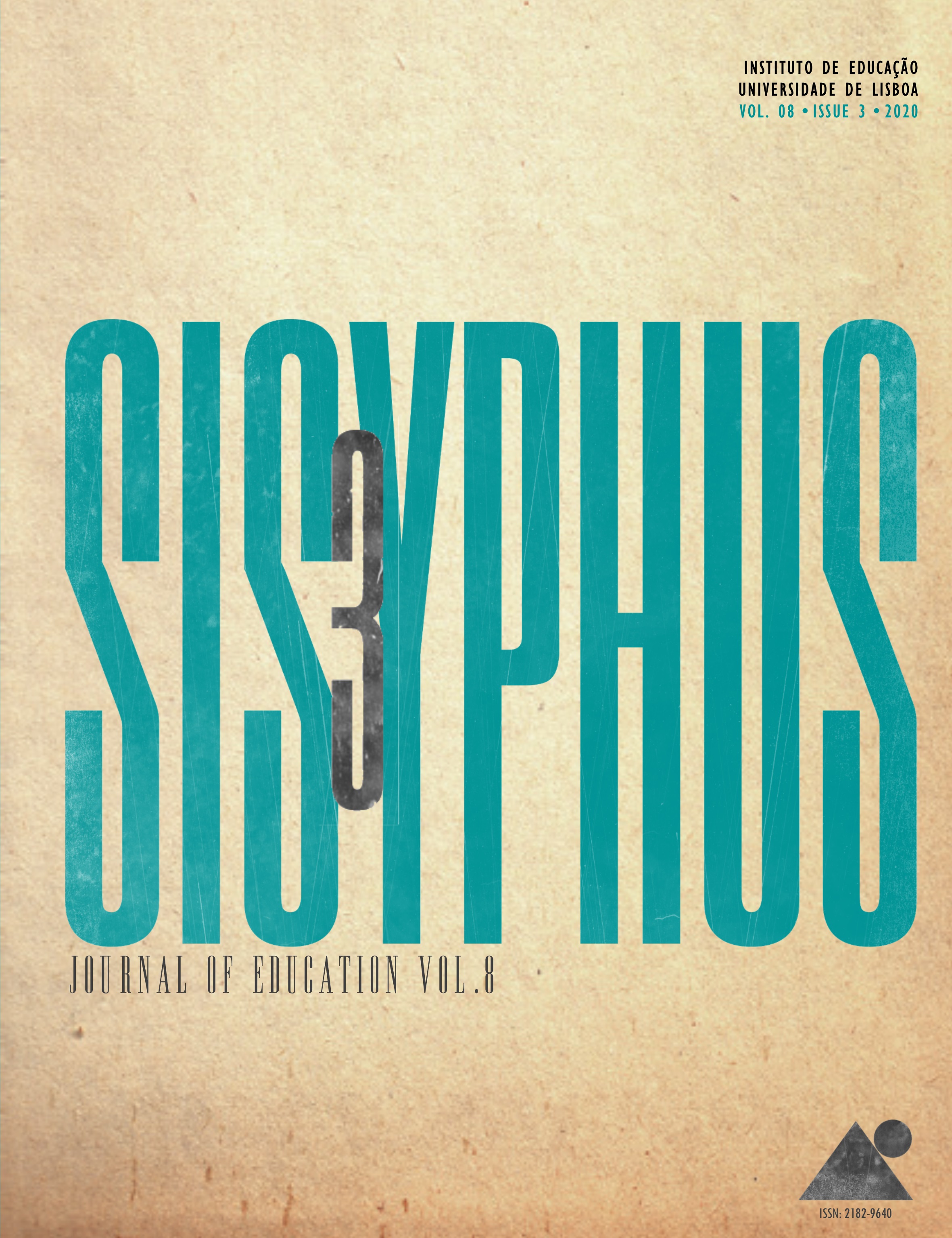A Experiência da Educação na Era da Anti-política
Ler John Dewey na Terceira Década do Século XXI
DOI:
https://doi.org/10.25749/sis.19986Palavras-chave:
disposição, instrumentalismo, anti-política, democracia, educação, raça, as artesResumo
O argumento de Dewey sobre a educação baseia-se no fato de que, como seres livres e inteligentes, temos o poder de desenvolver disposições. Mas num contexto em que a anti-política esterilizou a democracia, a leitura de Dewey revela a necessidade urgente de revisitar o seu método de experiência e experimentação. Revendo a crítica de Horkheimer a Dewey, que revela duas noções opostas de instrumentalismo, este ensaio conclui que, a menos que Dewey seja reavaliado pelo caráter não-identitário do seu pragmatismo, é provável que a sua filosofia da educação esteja em conformidade com o construtivismo social, onde o método Deweyano estará propenso ao que Maxine Greene chama de disjunção na cultura entre a vida cotidiana e a razão, onde desaparecem as “integrações” que Dewey valoriza na noção de experiência. É feita referência aqui à discussão de Lorraine Hansberry e James Baldwin sobre uma democracia que é mais uma “casa em chamas” do que um modo de vida associado.
Downloads
Referências
BALDACCHINO, J. (2009). Education Beyond Education. Self and the imaginary in Maxine Greene’s philosophy. New York: Peter Lang.
BALDACCHINO, J. (2014). John Dewey. Liberty and the Pedagogy of Disposition. Dordrecht, New York: Springer.
BALDWIN, J., CAPOUYA, E., HANSBERRY, L., HENTOFF, N., HUGHES, L., & KAZIN, A. (1961). The Negro in American culture. Cross Currents, 11(3), 205-224.
BERLIN, I. (1998). Two Concepts of Liberty. In H. HARDY & R. HAUSHEER (Eds.), The Proper Study of Mankind. An Anthology of Essays (pp. 191-242). London: Pimlico.
BERNSTEIN, R. J. (1966). John Dewey. Atascadero: Ridgeview.
BOBBIO, N. (1995a). Il Futuro della Democrazia. Torino: Einaudi.
BOBBIO, N. (1995b). Stato Governo e Società. Torino: Einaudi.
BUNZEL, J. H. (1967). Anti-politics in America; reflections on the anti-political temper and its distortions of the democratic process. New York: Knopf.
CAMUS, A. (1991). The Myth of Sisyphus and Other Essays. New York: Vintage.
COLLINGWOOD, R. G. (1999). The New Leviathan: Or Man, Society, Civilization and Barbarism. Oxford: Oxford University Press.
CROCE, B. (1907). Ciò che è vivo e ciò che è morto della filosofia di Hegel. Laterza
DEWEY, J. (1893). The superstition of necessity. The Monist, 3(3) (April), 362-379.
DEWEY, J. (1896). The reflex arc concept in psychology. The Psychological Review, 3(4) (July), 357-370.
DEWEY, J. (1953). Essays in experimental logic. New York: Dover Publications.
DEWEY, J. (1958). Experience and Nature. New York: Dover Publications.
DEWEY, J. (1966). Democracy and Education. New York: The Free Press.
DEWEY, J. (1984). Individualism Old and New. Amherst NY: Prometheus Books.
DEWEY, J. (1989). Freedom and Culture. Amherst NY: Prometheus Books.
DEWEY, J. (1997). Experience and Education. New York: Touchstone.
DEWEY, J. (2000). Liberalism and Social Action. Amherst NY: Prometheus Books.
GIROUX, H. A., & BHATTACHARYA, D. (2017). Anti-politics and the scourge of authoritarianism. Social Identities, 23(5), 503-517. DOI: https://doi-org.ezproxy.library.wisc.edu/10.1080/13504630.2016.1219145
GREENE, M. (1973). Teacher as Stranger. Educational philosophy for the modern age. Belmont CA: Wadsworth Publishing.
GREENE, M. (1988). The Dialectic of Freedom. New York: Teachers College Press.
HICKMAN, L. A., NEUBERT, S., & REICH, K. (Eds.) (2009). John Dewey between pragmatism and constructivism. New York: Fordham University Press.
HOBBES, T. (1982 [1651]). Leviathan. London: Penguin.
HORKHEIMER, M. (1974). Eclipse of Reason. New York: Continuum.
HORKHEIMER, M. (2012). Critique of instrumental reason. New York: Verso.
JACOBS, B., & LAUGHLAND, O. (2017, August 16). Charlottesville: Trump reverts to blaming both sides including ‘violent alt-left’. The Guardian. Retrieved 25 April 2020, from: https://www.theguardian.com/us-news/2017/aug/15/donald-trump-press-conference-far-right-defends-charlottesville
RETTER, H. (2012). Dewey’s progressive education, experience and instrumental pragmatism with particular reference to the concept of Bildung. In P. SILJANDER, A. KIVELÄ & A. SUTINEN (Eds.), Theories of Bildung and growth. Connections and controversies between continental educational thinking and American pragmatism (pp. 281-302). Rotterdam: Sense Publishers.
RORTY, R. (1980). Philosophy and the Mirror of Nature. London: Blackwell.
RORTY, R. (1982). Consequences of Pragmatism. University of Minnesota Press.
RORTY, R. (1990). Contingency Irony and Solidarity. Cambridge University Press.
RUITENBERG, C. (2011). The trouble with dispositions: a critical examination of personal beliefs, professional commitments and actual conduct in teacher education. Ethics & Education, 6(1), 41-52. DOI: https://doi-org.ezproxy.library.wisc.edu/10.1080/17449642.2011.587347
SINDERBRAND, R. (2017, January 22). How Kellyanne Conway ushered in the era of ‘alternative facts’. The Washington Post. Retrieved from: https://www.washingtonpost.com/news/the-fix/wp/2017/01/22/how-kellyanne-conway-ushered-in-the-era-of-alternative-facts/
SKINNER, Q. (1998). Liberty Before Liberalism. Cambridge University Press.
SKINNER, Q. (2002). A Third Concept of Liberty. In London Review of Books. 24(7)4, 16-18.
VICO, G. (2000 [1744]). New Science. London: Penguin.
Downloads
Publicado
Edição
Secção
Licença
O Copyright (c) pertence à Sisyphus – Journal of Education. No entanto, encorajamos que os artigos publicados na revista sejam publicados noutros lugares, desde que seja solicitada a autorização da Sisyphus e os autores integrem a nossa citação de fonte original e um link para o nosso site.
Política de auto-arquivo
É permitido aos autores o auto-arquivo da versão final publicada dos seus artigos em repositórios institucionais, temáticos ou páginas web pessoais e institucionais.
Subscritor DORA
O Instituto de Educação da Universidade de Lisboa, editor da Sisyphus, é um dos subscritores da Declaração de São Francisco sobre Avaliação da Investigação (DORA).





